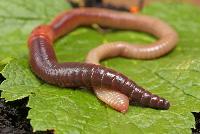
Earthworms
Get Price Quote
These highly active red worm colonies speed up the entire natural composting process, by many months, by literally chewing through heaps of dead organic material, whilst continually beneficiating the fertility of the resultant humus with the richness of their castings, which are eventually utilized enthusiastically by plants. Worm castings are an extremely good plant food as they are always rich in nutriments, minerals, beneficial microbes, enzymes and plant hormones. Beneficial microbes associated with vermicasts have been scientifically shown to directly reduce bacteriological pathogens in soils upon which the worm compost is spread. isumorganicindia: Suitable Varieties of Composting Worms for Vermiculture For the worm farmer, wanting to set up worm composting bins, the red manure worms are a far better bet than the more stolid greyish-brown earthworms. The lively reds, reproduce far more quickly and are much easier to manage, because their habitat is epigeic i.e. at the interface with the surface. Unfortunately the common names of the different species of composting worms are confused by loose terminology and sometimes different worms are called by the same name. Unless the scientific (latin) name is also used, there is likely to be some confusion. The most common manure worm used in worm farming in the US is the red worm, (Eisenia foetida or fetida), alias redworm, red wiggler, red wriggler, brandling worm and often confused with the similar looking tiger worms (Eisenia Andrei). In the UK the larger nightcrawlers (dendrobeana) are much favoured for worm farming, especially for fishing worms. A species of European worm, the driftworm, also known as Red wriggler (Lumbricus rubellus) is also commonly used in vermiculture, especially for fishing bait as it is large, lively, robust and is even suitable for salt water fishing.

live earthworm
Get Price Quote
live earthworm, vermicompost, Vermiwash, earthworm manure, Earthworm
Best Deals from Live Earthworm